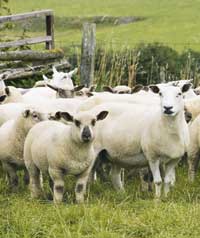MV infection on the increase in sheep flocks

There has been a worrying increase in Maedi Visna (MV) infection in sheep flocks, according to SAC vets.
In a letter published in the Vet Record, they highlighted that in the first seven months of the year there have been 11 breakdowns among flocks in the MV Accreditation Scheme – eight more than previous routine tests of sheep in the scheme have identified.
SAC urges flockmasters to consider their biosecurity, particularly since infection has also been found in a group of sheep during their first qualifying test to join a MV-accredited flock.
The breakdowns involve sheep from Texel, Charollais, Zwartble, Clun Forest, Border Leicester, Mule and Beltex cross breeds.
This is a wake-up call for sheep farmers, says Lewis McClinton, chief executive of the Suffolk Sheep Society, “MV is the kind of disease that is hard to spot and can cause great damage.
“The increasing rate of MV breakdown in 2010 is a worrying trend, but demonstrates the effectiveness of detection in the accreditation scheme. I would strongly advise pedigree flocks to participate in the MV Accreditation scheme and urge commercial ram buyers to source rams from accredited Flocks.”
According to Brian Hosie, SAC Consulting, vet service manager, MV is not always something practice vets think of when presented with a problem flock.
“Despite feeding, sheep with MV infection lose condition, some will abort lambs and others may die. Many things can have affects like these on sheep, so MV is not always on any vet’s radar.”
However, with so few major outbreaks some producers have taken the view that the threat posed by MV is not serious. According to Mr Hosie, such an attitude could have devastating results.
“If this view was to prevail and the currently high membership of the scheme was to decline, there is every reason to suspect MV would have the impact here that it already has on the Continent.”
Brian Hosie urges farmers to take note of the story told by Isle of Wight farmer Andrew Hodgson, the owner of a 1500-ewe commercial flock, who has estimated that MV reduced his flock’s output by 20-40% at a cost of £30,000-50,000 a year.
